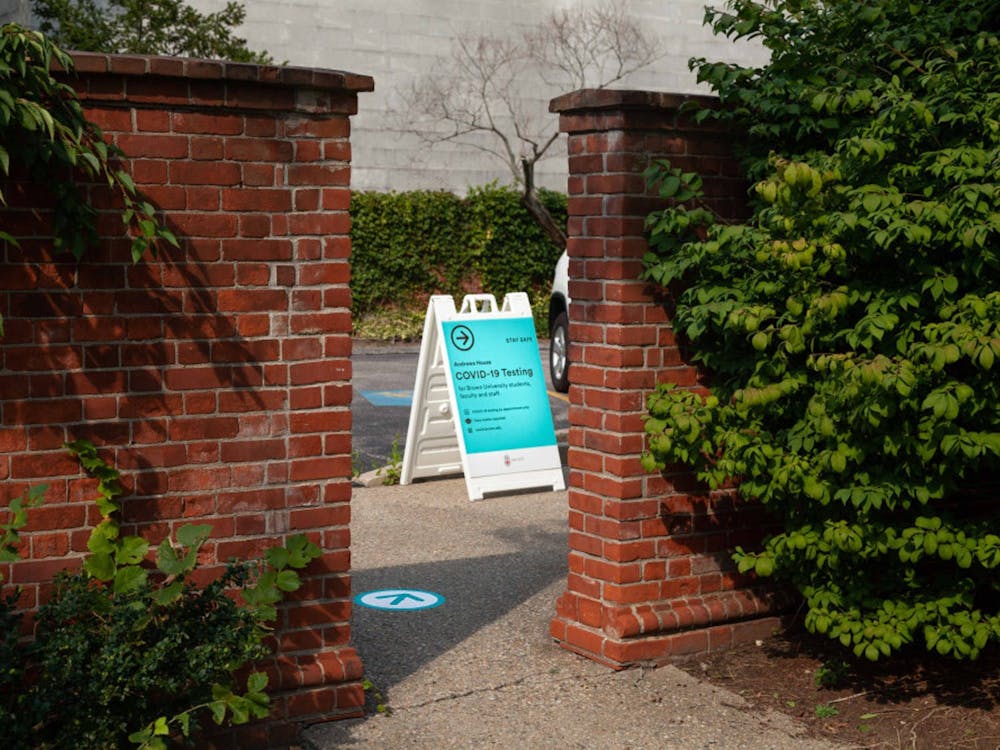After making testing optional for fully vaccinated students Oct. 25, Brown became the first Ivy League institution to not require regular COVID-19 testing for its undergraduate student body. As the University and its peer institutions modify COVID-19 restrictions and scale back testing operations, students and administrators at Brown have expressed hope for an eventual return to normalcy.
The uptick in cases campus saw in early September prompted further restrictions on student activity and the re-introduction of mandatory semiweekly asymptomatic testing for vaccinated students. According to the Dartmouth, the University’s peer institutions implemented similar policies around the same time period: vaccinated undergraduates were required to get tested twice a week at Harvard, twice a month at Penn and once weekly at Dartmouth, Princeton, Yale and Cornell.
Some University precautions mirrored those of peer institutions that began their 2021-22 academic calender sooner than Brown. The mandatory twice-a-week testing requirements, as well as restrictions on indoor dining and social gatherings, were partly modeled on similar policies at Cornell and Duke University — both of which tightened restrictions after spikes in on-campus positivity rates, The Herald previously reported.
“We pay a lot of attention to what’s happening on other campuses,” said Russell Carey ’91 MA ’06, executive vice president for planning and policy. “Being informed by their experiences was helpful in terms of providing information and context, though it has never been the driving factor in (policy) decisions.”
The University has rolled back restrictions, reopening indoor dining Sept. 22 following a “significant decline in both the absolute number and the rate of positive asymptomatic COVID-19 cases on campus compared to the first few weeks of the semester,” Carey previously wrote in an email to The Herald.
The University also reduced testing requirements for vaccinated undergraduates, first decreasing the frequency of mandatory asymptomatic testing to once weekly Oct. 6. This was followed by the complete removal of asymptomatic testing requirements for vaccinated undergraduates Oct. 25 and the scaling down of testing site operating hours Nov. 8.
Both vaccinated and unvaccinated undergraduates at all seven other Ivy League institutions are still required to participate in some sort of mandatory asymptomatic testing regimen, according to the schools’ respective COVID-19 dashboards.
The University’s decisions to roll back testing rates and reopen indoor dining were informed by sustained low positivity rates of “a tenth of a percent or below … really since mid-September,” Carey said. Also, given that the vast majority of undergraduates are vaccinated, the University has “no concerns about severe illness or hospitalizations,” he added.
The University takes guidance from the Centers for Disease Control and Prevention and tries to take extra precautions as well, Carey noted. With the start of the semester, he said, “given the nature of our community and the desire to ease back into fully in-person,” the University wanted to take its time in rolling back restrictions to align with the looser CDC guidelines.
“I was very surprised when I found out about optional testing,” said Abigail Carbajal ’23. Carbajal has been on campus since August 2020, with a brief recess in summer 2021. “It feels so weird not having to be tested for the first time in over a year,” she said.
Carbajal intends to continue to get tested for the time being “just to make sure I am keeping myself and others safe,” but said that she feels safe on campus as long as her peers “continue to be cautious.”
Tori Borlase, president of the undergraduate assembly at Penn, is still required to get tested twice monthly, along with the rest of her peers. This requirement has been in place since the beginning of the semester but has decreased since last semester, when “all students were required to get tested twice a week,” she wrote in an email to The Herald.
Like Brown, Penn maintains a masking requirement in all campus buildings and has reopened indoor dining, returned dorms to full capacity and resumed most in-person operations, Borlase wrote.
Brown has also made efforts to accommodate remote students with classes that are recorded, taught online or otherwise accessible. But Borlase has not observed this effort at Penn, and noted that some clubs are still meeting on Zoom given that “many buildings are not allowing student groups to book rooms due to COVID.”
“It will be interesting to see if positivity rates remain low after Thanksgiving break, and if they’ll reopen any of the testing sites they just closed,” Carbajal said, referencing the policy that all students must receive two tests upon their return to campus. “I don’t really keep track of COVID at other schools. I’m definitely surprised to hear that we’re the only Ivy not requiring testing,” she added. “Obviously, I’m hoping for the best. I’d say I’m cautiously optimistic.”





